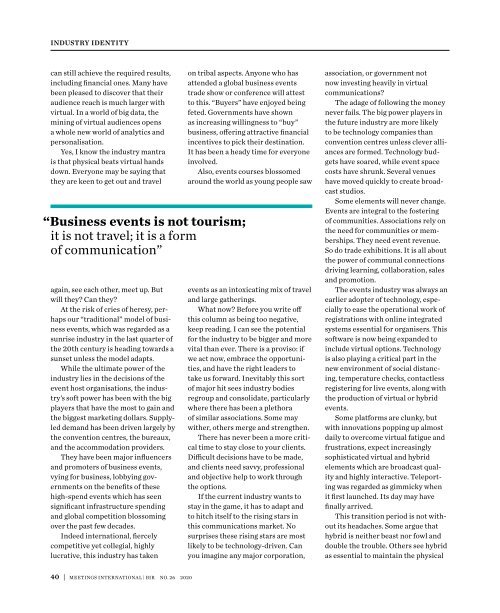meetings-international 26
Create successful ePaper yourself
Turn your PDF publications into a flip-book with our unique Google optimized e-Paper software.
INDUSTRY IDENTITY<br />
can still achieve the required results,<br />
including financial ones. Many have<br />
been pleased to discover that their<br />
audience reach is much larger with<br />
virtual. In a world of big data, the<br />
mining of virtual audiences opens<br />
a whole new world of analytics and<br />
personalisation.<br />
Yes, I know the industry mantra<br />
is that physical beats virtual hands<br />
down. Everyone may be saying that<br />
they are keen to get out and travel<br />
“Business events is not tourism;<br />
it is not travel; it is a form<br />
of communication”<br />
again, see each other, meet up. But<br />
will they? Can they?<br />
At the risk of cries of heresy, perhaps<br />
our “traditional” model of business<br />
events, which was regarded as a<br />
sunrise industry in the last quarter of<br />
the 20th century is heading towards a<br />
sunset unless the model adapts.<br />
While the ultimate power of the<br />
industry lies in the decisions of the<br />
event host organisations, the industry's<br />
soft power has been with the big<br />
players that have the most to gain and<br />
the biggest marketing dollars. Supplyled<br />
demand has been driven largely by<br />
the convention centres, the bureaux,<br />
and the accommodation providers.<br />
They have been major influencers<br />
and promoters of business events,<br />
vying for business, lobbying governments<br />
on the benefits of these<br />
high-spend events which has seen<br />
significant infrastructure spending<br />
and global competition blossoming<br />
over the past few decades.<br />
Indeed <strong>international</strong>, fiercely<br />
competitive yet collegial, highly<br />
lucrative, this industry has taken<br />
on tribal aspects. Anyone who has<br />
attended a global business events<br />
trade show or conference will attest<br />
to this. “Buyers” have enjoyed being<br />
feted. Governments have shown<br />
as increasing willingness to “buy”<br />
business, offering attractive financial<br />
incentives to pick their destination.<br />
It has been a heady time for everyone<br />
involved.<br />
Also, events courses blossomed<br />
around the world as young people saw<br />
events as an intoxicating mix of travel<br />
and large gatherings.<br />
What now? Before you write off<br />
this column as being too negative,<br />
keep reading. I can see the potential<br />
for the industry to be bigger and more<br />
vital than ever. There is a proviso: if<br />
we act now, embrace the opportunities,<br />
and have the right leaders to<br />
take us forward. Inevitably this sort<br />
of major hit sees industry bodies<br />
regroup and consolidate, particularly<br />
where there has been a plethora<br />
of similar associations. Some may<br />
wither, others merge and strengthen.<br />
There has never been a more critical<br />
time to stay close to your clients.<br />
Difficult decisions have to be made,<br />
and clients need savvy, professional<br />
and objective help to work through<br />
the options.<br />
If the current industry wants to<br />
stay in the game, it has to adapt and<br />
to hitch itself to the rising stars in<br />
this communications market. No<br />
surprises these rising stars are most<br />
likely to be technology-driven. Can<br />
you imagine any major corporation,<br />
association, or government not<br />
now investing heavily in virtual<br />
communications?<br />
The adage of following the money<br />
never fails. The big power players in<br />
the future industry are more likely<br />
to be technology companies than<br />
convention centres unless clever alliances<br />
are formed. Technology budgets<br />
have soared, while event space<br />
costs have shrunk. Several venues<br />
have moved quickly to create broadcast<br />
studios.<br />
Some elements will never change.<br />
Events are integral to the fostering<br />
of communities. Associations rely on<br />
the need for communities or memberships.<br />
They need event revenue.<br />
So do trade exhibitions. It is all about<br />
the power of communal connections<br />
driving learning, collaboration, sales<br />
and promotion.<br />
The events industry was always an<br />
earlier adopter of technology, especially<br />
to ease the operational work of<br />
registrations with online integrated<br />
systems essential for organisers. This<br />
software is now being expanded to<br />
include virtual options. Technology<br />
is also playing a critical part in the<br />
new environment of social distancing,<br />
temperature checks, contactless<br />
registering for live events, along with<br />
the production of virtual or hybrid<br />
events.<br />
Some platforms are clunky, but<br />
with innovations popping up almost<br />
daily to overcome virtual fatigue and<br />
frustrations, expect increasingly<br />
sophisticated virtual and hybrid<br />
elements which are broadcast quality<br />
and highly interactive. Teleporting<br />
was regarded as gimmicky when<br />
it first launched. Its day may have<br />
finally arrived.<br />
This transition period is not without<br />
its headaches. Some argue that<br />
hybrid is neither beast nor fowl and<br />
double the trouble. Others see hybrid<br />
as essential to maintain the physical<br />
40 | MEETINGS INTERNATIONAL | BIR No. <strong>26</strong> 2020

















